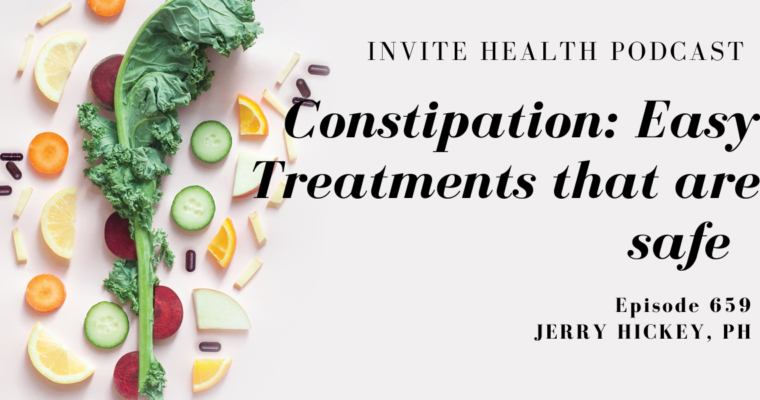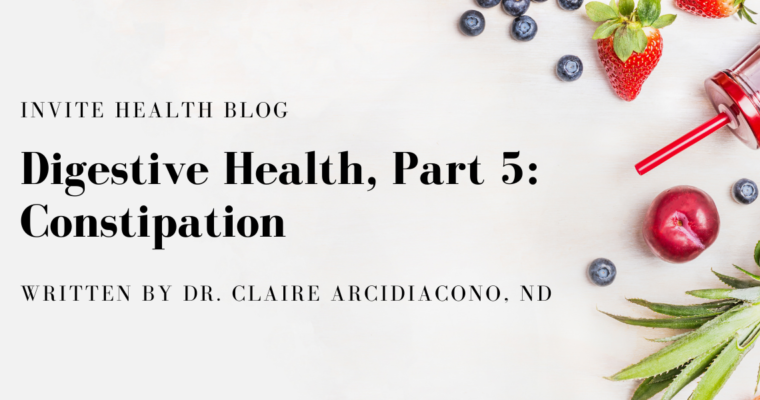Gas
Gas build-up is as natural as it gets. Your diet is of course a major factor. Bacteria from the food we eat during the course of the day ferments in your intestines. So the more fermented foods you eat, the more gas you’re going to have. If gas is being produced in the small intestine and colon, it tends to move down through the system and come out as flatulence.
If you’re getting gas more often than before, however, you may be experiencing a bacterial imbalance. The best way to resolve this is to avoid highly fermented foods, especially carbohydrates.
Over time, your ability to digest lactate products can change. So, if once upon a time you were able to enjoy tons of dairy and suddenly you’re getting cramps and extra gas, it may not be able to handle the enzymes as well as before. If gas is becoming an issue, speak to your doctor on other alternative remedies for good digestive health.
Constipation
By: Dr. Claire Arcidiacono, ND of InVite® Health
Constipation is the elephant in the room that no one wants to talk about. What exactly is constipation? Many people believe that having a bowel movement every other day or even every three days is okay. But the truth of the matter is you should have a bowel movement every day. Think of your body as your home – do you take the trash out, or do you let it sit and fester? Well, moving your bowels every day is like taking out the trash, and it’s just as important to clear the trash from your body as it is from your home!
If you are not having a bowel movement every day, you have constipation. Another sign of constipation is having trouble with a bowel movement. Additionally, if there is pain, gas, bloating, and a “smell” associated with having a bowel movement, there is most likely what I usually term “low-grade constipation”.
After years of research and updated technology, the old saying, “you are what you eat” has become “you are what you eat, digest, and absorb.”
Low-grade Constipation
Low-grade constipation is where you have a bowel movement every day, but it is either hard, small, or leaves you feeling as if you still have to go. Let’s return to the trash analogy – low-grade constipation is when you take out only part of the trash and leave some behind. To sum everything up: In order to be healthy you should have a complete, pain-free, non-smelly, non-gassy bowel movement every day.
What can cause constipation? There are many things that can factor in – lack of water, lack of fiber, low thyroid function, anxiety, cancer, and physical changes to the intestines can all affect regularity.
The “Bad Guys” are things like yeast, bad bacteria and parasites. According to research published in the Scandinavian Journal of Gastroenterology, people with Inflammatory Bowel Disease (which is characterized by constipation) have a higher diversity of fungus in their GI tract. In other words, there is a higher diversity of “bad guys”. The overall goal is to kill the “bad guys”, put the “good guys” back, and build up the body’s natural army – the immune system. In order to do that, the following vitamins and supplements may help – Magnesium Citrate, Goldenseal, Berberine, Oregano, Grapefruit Seed Extract, and Caprilic Acid, Lactobacillus, Bifidobacterium (Probiotics), and Saccharomyces, Colostrum, Milk Thistle, NAC, Dandelion, Alpha Lipoic Acid, Green Tea, Spirulina, Chlorella.
Click here for more information on the Importance of Probiotics, the “Good Guys”!
All of these things help address constipation by addressing the most common cause – the “bad guys”. They can grow because of stress, poor diet, certain medications, or even travel. Speak to one of InVite®’s professionals to determine what aspects of this protocol will be most helpful for you.
What other questions do you have about digestive health? Leave us a comment right here to join in the conversation!









